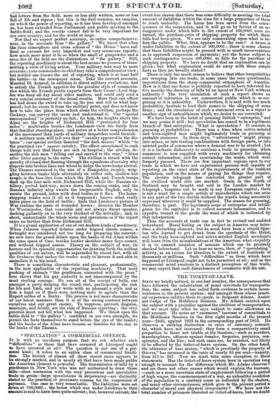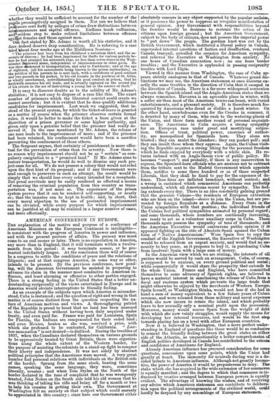THE TICKET-OF-LEAVE.
SINCE we briefly noticed, in our last number, the consequences that have followed the substitution of penal servitude for transporta- tion, the same subject has called forth evidence to certain incon- veniences in the present system; and amongst those whose practi- cal experience entitles them to speak, is Sergeant Adams, Assist- ant Judge of the Middlesex Sessions. Mr. Adams entered upon the subject with a prejudice against the abolition of transportation, and we must take what he says subject to some allowance on that account. He notes an " enormous " increase of committals to the Middlesex Sessions in the' first eight months of the present year-2458, against 1923 in the corresponding part of 1853. He observes a striking distinction in cases of summary commit- tal, which have not increased : they form a comparatively small proportion to those not triable at his Sessions,—such as murders, manslaughters, offences against females, forgeries, perjuries, con- spiracies, and the like ; and such cases are, he assumes, not likely to be affected by the ticket-of-leave system. On the other hand, the utterance of base money, " which is peculiarly the property of thieves," has increased in the ratio of nearly 35 per cent—namely, from 213 to 287. Now we must take some exception to these statements. Has the ticket-of-leave system been in operation long enough to account for the difference which Mr. Adams observes? and are there not other causes which would explain the increase, —such as a more uncertain state of employment following a period of high wages, the commencement of a war, an unhealthy condition of the population in a sanitary sense as indicated by the cholera, and many other circumstances, which give to the present period a character of moral and physical irregularity?' We have not the total number of prisoners liberated on ticket-of-leave, but we doubt whether they would be sufficient to account for the number of the purls presumptively assigned to them. Nor can we believe that professors sent forth by colleges of crime draw distinctions between raii4emeanours and capital offences. Ruffians teach ruffianism, anvil' seldom stop to make refined limitations between offences agaSist females and those against men.
0& fact stated by Mr. Adams is worth all his statistics, and it does ,indeed deserve deep consideration. He is referring to a case tried4bout four weeks ago at the Middlesex Sessions-
" The prisoner had been from his childhood a notorious thief, and the as- sociate'of thieves ; he had been imprisoned for thefts for various periods be- fore he had attained his sixteenth year, no less than seven times in the West- minster Beidewell alone, independent of imprisonments in other gaols. He was then Antented to transportation, and sent to Parkhurst; and at the age of eighteen, (all his antecedents being known to the prison authorities,) on the petition of his parents he is sent back, with a certificate of good conduct and two pounds in his pocket, to his old haunts in the purlieus of St. Giles, so wholly unreformed, notwithstanding his good conduct in prison, that he forthwith resumes his old trade, and is actually captured on the second day of his return in the act of instructing a young lad in the science of theft.'
It is easy to discover doubts as to the solidity of Mr. Adams's statistics; it is not easy to dispose of a case like this. The exact number of prisoners which the liberated convict could create we cannot ascertain ; but it is evident that he does qualify additional candidates for imprisonment. Last week we suggested, that in- stead of the present system, by which the ticket-of-leave is granted as a matter of course when the prisoner observes certain formal rules, it would be better to make the ticket a boon given at the discretion of a prison governor or some higher authority, and given only upon a genuine belief that the prisoner had really de- served it. In the case mentioned by Mr. Adams, the release of one man leads to the imprisonment of more ; and if the prisoner had been retained, his confinement would have been a sacrifice preventing the confinement of those others.
The Sergeant argues, that certainty of punishment is more effec- tual for the prevention of crime than its severity. Now there is no reason why imprisonment should not be as " certain" as com- pulsory emigration to a " promised land." If Mr. Adams aims to restore transportation, he would do well to dismiss any such pro- ject ones for all. We do not possess a colony that would not rebel upon the first hint of its proposal; and if any Government were mad enough to persevere in such an attempt, the result would be simply that we should lose every colony intended for a receptacle. But penal servitude may be easily rendered as effectual a means of removing the criminal population from this country as trans- portation was, if not more so. The experience of the prison system proves that it can be rendered self-supporting, or nearly so; that the inmates can be kept in health ; and, in short, that every moral objection to the use of protracted imprisonment can be obviated, while every purpose for which imprisonment can be justified at all may be realized in a larger number of canes, and more effectually.



























 Previous page
Previous page